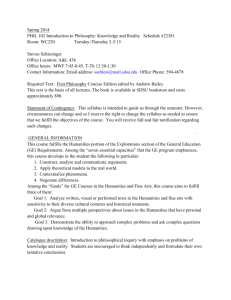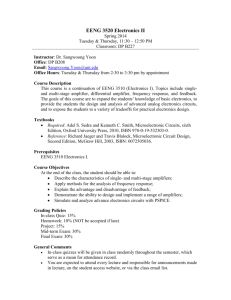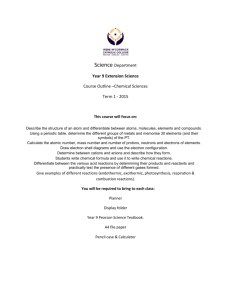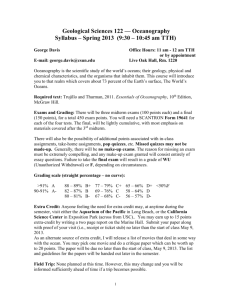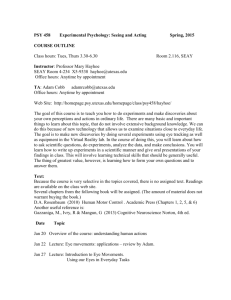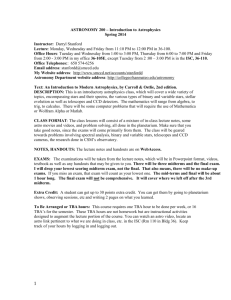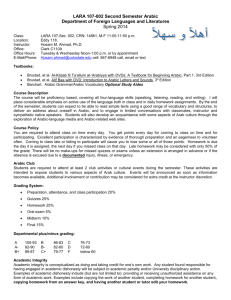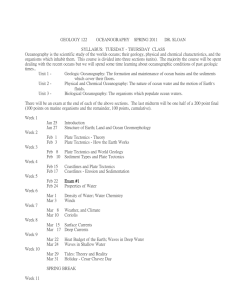Second Language Acquisition - CLAS Users
advertisement
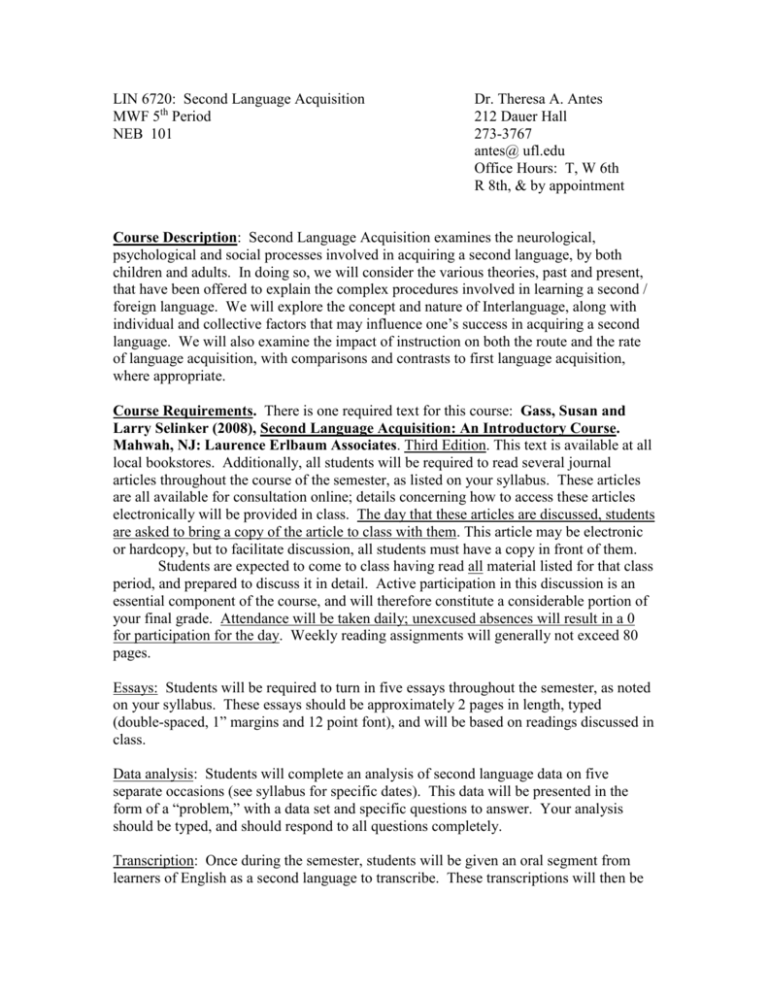
LIN 6720: Second Language Acquisition MWF 5th Period NEB 101 Dr. Theresa A. Antes 212 Dauer Hall 273-3767 antes@ ufl.edu Office Hours: T, W 6th R 8th, & by appointment Course Description: Second Language Acquisition examines the neurological, psychological and social processes involved in acquiring a second language, by both children and adults. In doing so, we will consider the various theories, past and present, that have been offered to explain the complex procedures involved in learning a second / foreign language. We will explore the concept and nature of Interlanguage, along with individual and collective factors that may influence one’s success in acquiring a second language. We will also examine the impact of instruction on both the route and the rate of language acquisition, with comparisons and contrasts to first language acquisition, where appropriate. Course Requirements. There is one required text for this course: Gass, Susan and Larry Selinker (2008), Second Language Acquisition: An Introductory Course. Mahwah, NJ: Laurence Erlbaum Associates. Third Edition. This text is available at all local bookstores. Additionally, all students will be required to read several journal articles throughout the course of the semester, as listed on your syllabus. These articles are all available for consultation online; details concerning how to access these articles electronically will be provided in class. The day that these articles are discussed, students are asked to bring a copy of the article to class with them. This article may be electronic or hardcopy, but to facilitate discussion, all students must have a copy in front of them. Students are expected to come to class having read all material listed for that class period, and prepared to discuss it in detail. Active participation in this discussion is an essential component of the course, and will therefore constitute a considerable portion of your final grade. Attendance will be taken daily; unexcused absences will result in a 0 for participation for the day. Weekly reading assignments will generally not exceed 80 pages. Essays: Students will be required to turn in five essays throughout the semester, as noted on your syllabus. These essays should be approximately 2 pages in length, typed (double-spaced, 1” margins and 12 point font), and will be based on readings discussed in class. Data analysis: Students will complete an analysis of second language data on five separate occasions (see syllabus for specific dates). This data will be presented in the form of a “problem,” with a data set and specific questions to answer. Your analysis should be typed, and should respond to all questions completely. Transcription: Once during the semester, students will be given an oral segment from learners of English as a second language to transcribe. These transcriptions will then be made available to everyone in the class, along with the oral samples, as data to be analyzed for use in the final projects (see below). More complete information on how to transcribe will be provided in class. Midterm Exam: Students will take a midterm exam at the half-way point in the semester. Format of the exam will be discussed in class. Final Research Project: A major component of the final grade for this class will consist of a final research project on a topic of the student’s choice, but related to topics that we have discussed in class. This project will be completed in stages (see the weekly calendar for due dates for each of the drafts), consisting of an annotated bibliography, a review of the literature, and data analysis based on the samples made available in class. Final completed papers are due no later than April 27 at 3 pm in 301 Pugh Hall or turned in to me in my office in 212 Dauer Hall (earlier is certainly acceptable). I will not accept electronic submissions of your final papers. Grading System: Course participants will receive letter grades for all required work. The final grade for this course will be distributed in the following way: Participation and preparation: 15% Reaction essays 15% Transcription 5% Data analysis 15 % Midterm exam 20% Final research paper 30%: Abstract and annotated bibliography: 5% Presentation: 5% Final paper: 20% Lit. review: 10% Data analysis: 10% Final Letter Grade: A=93-100; A-=90-92; B+=87-89%; B=83-86%; B-=80-82; C+=7779%; C=73-76%; C-=70-72; D+=67-69%; D=63-66%; D-=60-62; E=below 60%. S is equivalent to C or better. The College of Liberal Arts and Sciences requires that students earn a final grade of C or better (or S) in order satisfy general education requirements. Note that a C- does not satisfy this requirement; students must earn a C or better in the course in order to move on to the next course and satisfy general education requirements. According to university guidelines, letter grades will convert to GPA as follows: A = 4.0; A- = 3.67; B+ = 3.33; B= 3; B- = 2.67; C+ = 2.33; C = 2.0; C- = 1.67; D+ = 1.33; D = 1.0; D- = .67; E = 0; WF = 0; I = 0 NG = 0; S-U = 0 For more information about grade calculation and GPA, refer to the UF undergraduate catalog: http://www.registrar.ufl.edu/catalog/policies/regulationgrades.html This syllabus may be adjusted at any time for pedagogical purposes. ACADEMIC DISHONESTY The University of Florida statement regarding academic honesty and more specifically “giving and/or receiving unauthorized aid on student’s work” reads as follows: “Giving information includes, but is not limited to, allowing other students to use or copy work or answers to exam questions either while the exam is being given or after having taken the exam. Further, the taking of information includes, but is not limited to, copying from the answers provided in the book or ancillary materials, copying from another student’s paper […], using information already written in books, […], or asking anyone, students or not to review and/or correct assignments. Students found in violation of this policy will be referred to the appropriate administration for appropriate action according to the student judicial process. Students may view the entire UF honor code at : http://www.dso.ufl.edu/sccr/honorcodes/honorcode.php STUDENTS WITH DISABILITIES The University of Florida policy related to accommodations for students with disabilities reads as follows: “Students requesting classroom accommodation must first register with the Dean of Students Office. The Dean of Students Office will provide documentation to the student who must then provide this documentation to the Instructor when requesting accommodation.” Students who believe they may qualify for accomodations should contact the Dean of Students Office: http://www.dso.ufl.edu/drc/current.php Weekly Calendar: Week 1: Jan. 5 Introduction. SLA Survey Jan. 7 Ch. 1 Gass and Selinker. pp 1-15 Week 2: Jan. 10 Ch. 2: Related Disciplines pp 20-38 Essay 1 due: #2 pp 1516. Jan. 12 Ch. 3: Second and Foreign Language Data pp 41-72 Jan. 14 Ch. 3 pp 72-88 Week 3: Jan. 17 Martin Luther King, Jr. day – no class Jan. 19 Hulstijn, “Second Language Acquisition Research in the Laboratory: Possibilities and Limitations.” Studies in SecondLanguage Acquisition 19(2): 131-143. Jan. 21 Discussion Essay 2 due: Reaction to Hulstijn article TBA Week 4: Jan. 24 Ch. 4: The Role of the Native Language pp 89-110 Jan. 26 Discussion Data Analysis 1 due #10 pp 113-120 Jan. 28 Ch. 5 The Role of Previously Known Languages pp 121-135 Week 5: Jan. 31 pp 136-155 Feb. 2 Discussion Feb. 4 Ch. 6 Formal Approaches to SLA pp 159-177 Essay 3 due #5 p. 157 Week 6: Feb. 7 pp 178-189 Feb. 9 Discussion Feb. 11 Ch. 7 Typological and Functional Approaches pp 191-213 Transcription due Week 7: Feb. 14 Leow, Ron. (2000). “A Study of the Role of Awareness in Foreign Language Behaviors: Aware versus Unaware Learners. SSLA. 22(4): 499-533. Feb. 16 Discussion Feb. 18 Ch. 8 Interlanguage Processing pp 219-241 Data Analysis 2 due: EITHER # 5 or 6 pp 215-216 Week 8: Feb. 21 pp 241-255 Feb. 23 Discussion Feb. 25 Midterm examination Week 9: Feb. 28 Ch. 9 Interlanguage in context pp 259-280 Mar. 1 pp 280-294 Mar. 3 Discussion Data Analysis 3 due: TBA - video Spring Break – March 4-13 Week 10: Mar. 14 Ch. 10 Input, Interaction and Output pp 304-341 Mar. 16 pp 341-362 Mar. 18 Mackey et al. (2000). “How Do Learners Perceive Implicit Negative Feedback?” SSLA. 22(4): 471-497. Week 11: Mar. 21 Discussion Essay 4 due: reaction to Mackey et al article TBA. Mar. 23 Ch. 11 Instructed Second Language Learning pp 368-393 Mar. 25 Tarone, Elaine and Martha Bigelow. (2005). “Impact of Literacy on Oral Language Processing: Implications for Second Language Acquisition Research. ARAL 25: 77-97. Abstract and Annotated Bibliography due Week 12: Mar. 28 Discussion Mar. 30 Ch. 12 Beyond the Domain of Language pp 395-426 Data Analysis 4 due p. 364 #5 Apr. 1 pp 426-445 Week 13: Apr. 4 Discussion Apr. 6 Ch. 13 The Lexicon pp 449-466 Essay 5 due: p. 394, # 4 AND 5 Apr. 8 pp 467-475 AND Wolter, Brent. (2001). “Comparing the L1 and L2 Mental Lexicon: A Depth of Individual Word Knowledge Model.” SSLA. 23(1): 41-69. Week 14: Apr. 11 Poster presentations Apr. 13 Poster presentations Data Analysis 5 due: TBA Apr. 15 No Class – final paper preparation time Week 15: Apr. 20 Ch. 14 An Integrated View of SLA pp 479-492 Apr. 22 Last day of class. Conclusions Monday April 27, 3 pm: All final papers due in 301 Pugh Hall, or in my office: 212 Dauer Hall.




